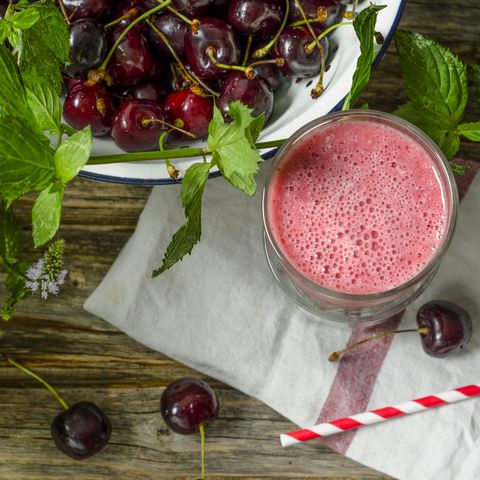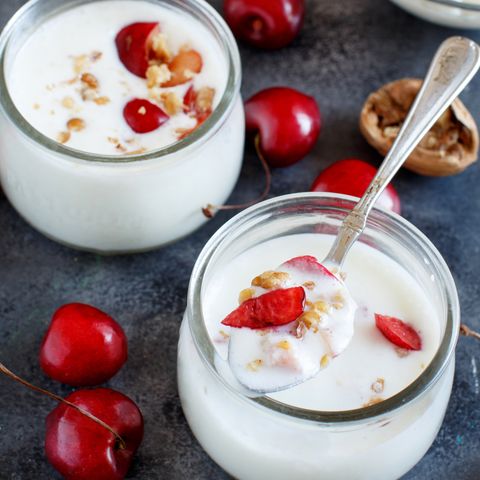If you’re trying to be the most swole version of yourself but aren’t focused on diet, you’re doing yourself a serious disservice. The benefits of exercise are only partially determined by what you actually do at the gym. Other factors like your diet affect your physical results—and your health, too.
“Nutrition is what powers everything you do. It’s gas in the car,” says Albert Matheny, RD, CSCS, the co-founder of SoHo Strength Lab, Promix Nutrition, and Arena. If you eat well—and get the timing right—“you’ll have more energy, making it easier to work out,” Matheny says. But “the opposite is also true,” he adds. Meaning, filling up on the wrong foods and missing certain key eating windows can make it harder to go all out during workouts and reach your fitness goals.
Read ahead and keep our back-to-basics diet habits in mind, so you can get maximum output from your workout, every time.
1. Plan out meals and snacks.
Making food an afterthought is an easy way to torpedo your fitness goals. “Too many people don’t plan their nutrition out and then make poor choices when they get hungry,” says Joey Gochnour, RDN, NASM-CPT, a board-certified specialist in sports dietetics at Nutrition and Fitness Professional. Consider the times you’ll actually have time to eat, what your physical needs will be for the day, and when you need to have peak energy for a workout. (Pro-tip: Before hitting the gym, reach for a simple carb, like sweet cherries. Think: Bing, Lapin, and Sweetheart.) Then create meals around your schedule. (More on actual timing later.)
Just keep this in mind: These meals and snacks don’t have to be complicated. “You don’t need to have extensive cooking ability to put peanut butter on a bagel, pour a bowl of cereal or oatmeal, or make a sandwich with a piece of fruit and a glass of milk,” Gochnour says.
2. Make sure you’re eating enough.
Undereating is a surprisingly easy trap to fall into if you’re regularly beast-moding at the gym—and one that can quickly catch up with you. “If you are chronically undereating calories and protein, you may not be able to recover properly between bouts of working out,” says Spencer Nadolsky, DO, chief physician of Renaissance Periodization. That means you may not be able to work out as hard as you’d like, whether it’s running faster or longer or lifting heavier weights with more reps.
To calculate how much fuel you’ll need on any given day to meet your goals, Nadolsky recommends checking out the National Institutes of Health’s Body Weight Planner tool. There, you can enter your current stats, such as height, weight, and activity level along with your goals. The planner will help you determine exactly how many calories you should eat in a day.
“In terms of protein goals, you can simplify things and shoot for around .75 grams per pound,” he says. So, if you weigh 180, strive to eat about 135 grams of protein each day.
3. Keep anti-inflammatory foods in the mix.

Some inflammation in your body is a normal part of the healing process post-workout, but too much can actually interfere with your recovery, says Samantha Cassetty, MS, RD, a nutrition and wellness expert who is the co-author of Sugar Shock. “Food can be a powerful way to control exercise-induced inflammation to help you recover faster and potentially reduce pain and soreness,” she says.
Anti-inflammatory foods tend to be high in antioxidants, Cassetty says. So, veggies and fruits are biggies—especially sweet cherries (which shouldn’t be confused with their tart counterparts). Research published in the Journal of Nutrition found that eating sweet Bing cherries, specifically, can significantly decrease inflammatory biomarkers in the body. (Bonus: Eating them on the regular can even help to prevent chronic inflammatory diseases like heart disease, diabetes, arthritis, and cancer.)
4. Eat something easily digestible before a workout.
Every person and their needs are slightly different but, in general, you want to think about the digestion time of what you’re eating, Matheny says. “Typically, you want to eat something before your workout that will digest faster, like simple carbohydrates,” Matheny says, listing off PB&J and oatmeal as possible options. “This increases your blood sugar and will give you an energy boost for a little bit.” Foods to avoid pre-workout include those that are high in fat, protein, and fiber because they’re slower to digest.
Timing matters, too. If you’re having carbs, Matheny recommends eating 20 to 30 minutes before a workout to get maximum results. If you’re having something a little heavier, one to two hours before go time is best.
5. Always refuel after exercising.
“It used to be that we told everyone to eat [a meal] immediately after workouts to help recover, but if you’re eating [something] within a few hours before a workout, you don’t have to rush to get that meal,” Nadolsky says.
Ideally, though, you’ll want to eat within two hours of your workout, and you’ll want to go big on protein. “Your muscles need protein to help them repair and rebuild, which will help maximize your strength gains,” Cassetty explains. “Your body also needs carbohydrates to replace what was used for energy during your workout. If you neglect to eat, you’re missing the chance to replace that muscle tissue, so you’re not going to get the maximum benefits from your workout, and it may even interfere with your ability to recover.”
6. Use food to sleep better and recover faster.

Proper rest and recovery can help you get back at it tomorrow. “Diet and sleep patterns are intertwined,” Cassetty says. She points to a small study of 26 adults that found people who ate a high-fiber diet spent more time in deep sleep than other participants while those who regularly chowed down on sugary foods were up more at night.
“A nutritious diet has also been shown to help reduce the time it takes to fall asleep,” Cassetty says. “Basically, if you aren’t eating well, your sleep may suffer. And if you eat nutritious, fiber-rich whole foods in the context of a healthy diet, you’re less likely to suffer from sleep problems.”
Worth noting: The same sweet cherries that can lower inflammation also contain melatonin, the hormone that controls your sleep-wake cycle. While Cassetty says eating a bowl of cherries alone won’t automatically make you conk out, cherries can help when you couple them with good sleep hygiene, like keeping your room dark and not spending too much time on your phone before bed.
7. Don’t forget the H2O.
Being even a little dehydrated can make you feel off at the gym. The American College of Sports Medicine said in a joint position statement with the Academy of Nutrition and Dietetics that 2 percent or more dehydration “can compromise cognitive function and aerobic exercise performances, particularly in hot weather.”
While hydration during your workout is important, Matheny says it’s especially crucial leading up to the main event. “It’s not going to do it if you’ve had one coffee all day and then chug a bottle of water before you work out,” he says. “You need to be drinking all day.”
Source: Read Full Article
